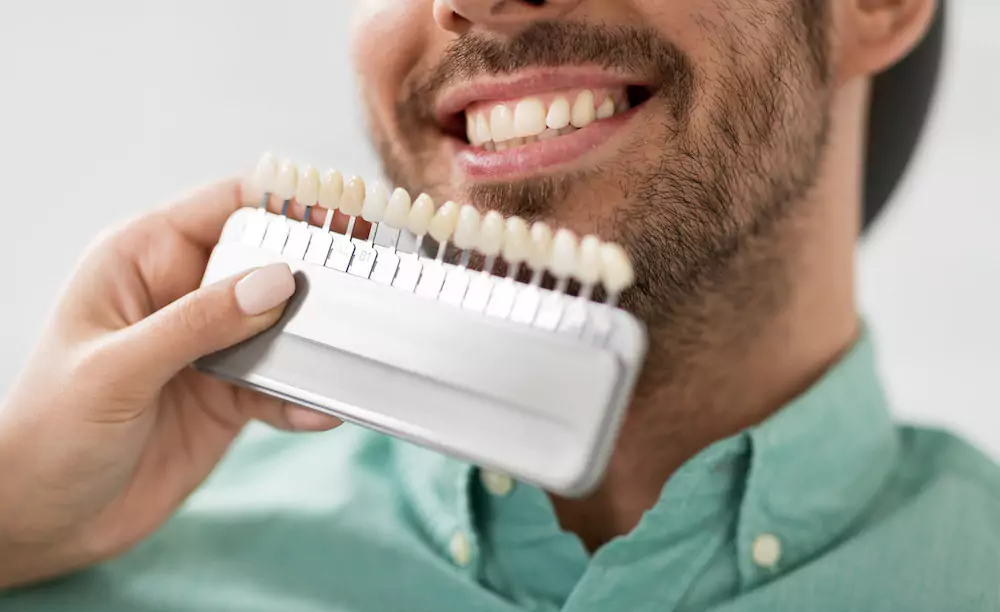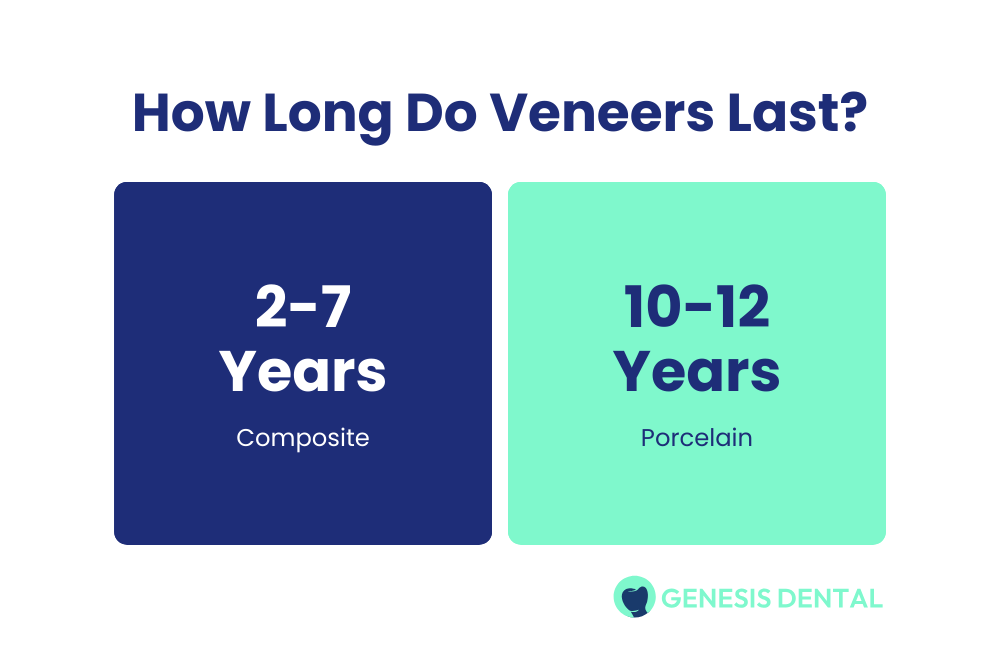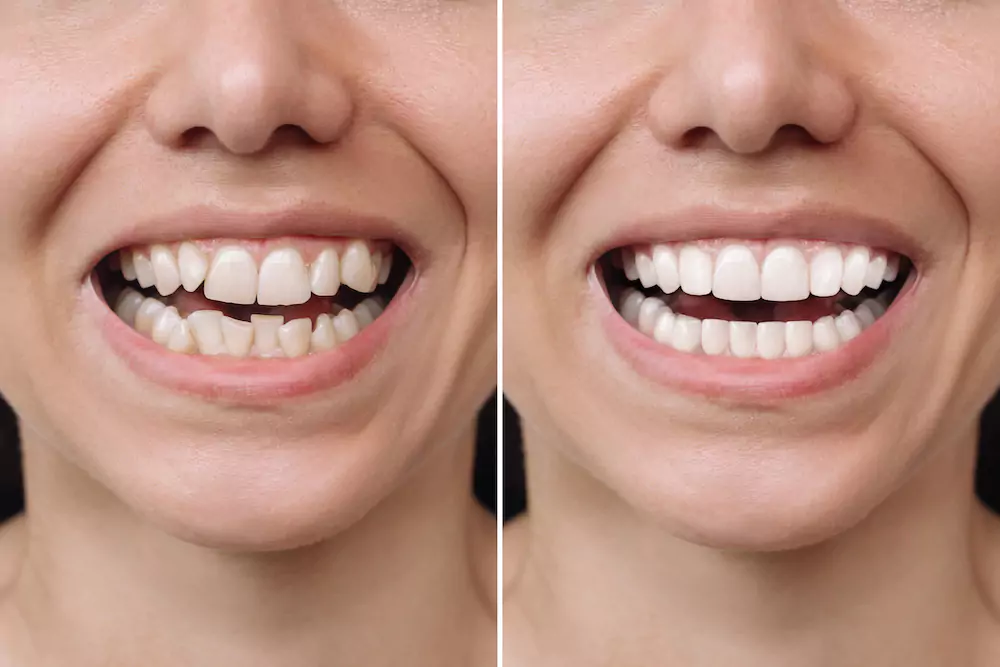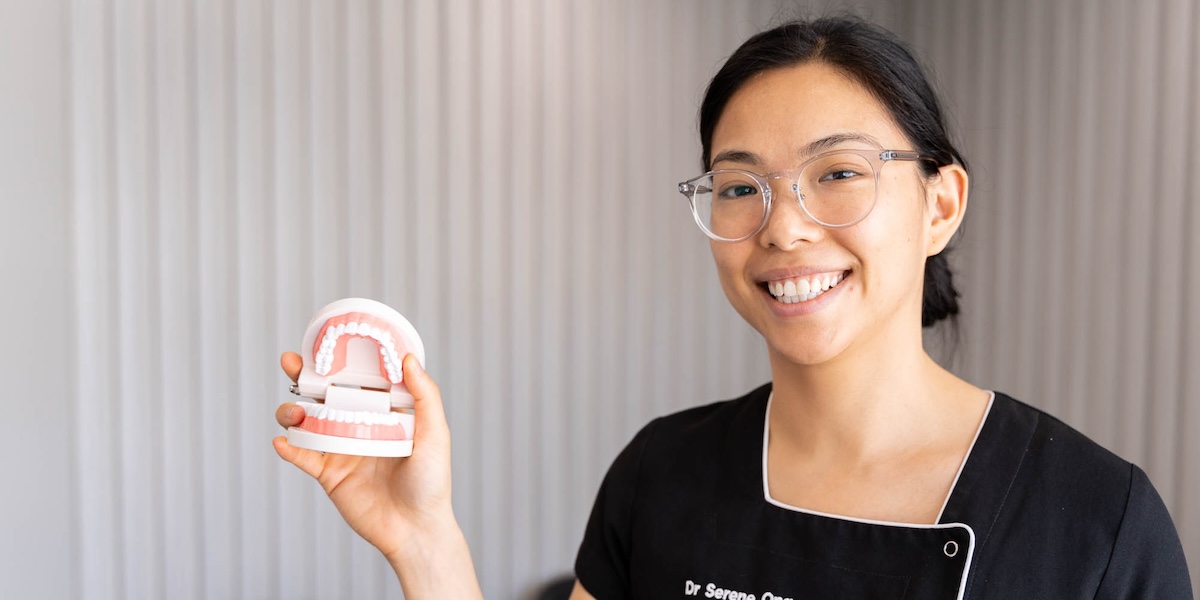
How Long Do Veneers Last?
Veneers can last anywhere from 2 to 12 years depending on a variety of factors including the material used and how well you care for your veneers.
Key Takeaways
- How Long Do Veneers Last? Veneers can last between 2 to 12 years, with porcelain veneers offering a longer lifespan of up to 12 years due to their durability and strength.
- Porcelain vs. Composite: Porcelain veneers are more durable, stain-resistant, and natural-looking but are more expensive and require more prep work. Composite veneers are more affordable and require less prep work but are less durable and stain easier.
- Veneer Benefits: Veneers offer a natural tooth appearance, stain resistance, low maintenance, and the ability to cover gaps, cracks, and chips effectively.
- Replacement Needs: Veneers will likely need replacement due to damage, staining, gum recession, or changes to the bite over time.
- Care Tips: To extend the life of veneers, maintain good oral hygiene, avoid using teeth as tools, see a dentist regularly, and limit the consumption of pigmented beverages and acidic foods.
How Long Do Veneers Last?
A variety of factors, including the material used and how well you care for your veneers, can affect longevity.
Veneers that are bonded directly to the enamel will have a longer lifespan compared to other veneers.
Read on to learn about the different types of veneers and how long veneers last.
How Long Do Porcelain Veneers Last?
Porcelain veneers are thin, tooth coloured shells that are custom-made and bonded directly to the surface of teeth. They require the most prep-work of any veneer type but also boast the highest strength and longest lifespan.
In my experience, porcelain veneers have a good lifespan, lasting from 10 to 12 years when cared for properly. In some cases, they can last even longer.
Benefits of porcelain veneers include:
- Longest lifespan amongst veneer types
- Ultra resistant to stains
- Durable and strong
- High resistance to fractures and breaks
- Mimic natural tooth appearance and function
- Offer an extremely accurate fit, helping to ensure there are no spaces or gaps where food debris can get trapped and lead to plaque build up
- Wide selection of colours
- May be more cost-effective in the long run even though they are more expensive initially
Disadvantages of porcelain veneers include:
- Damaged veneers are not able to be repaired and can only be replaced
- Requires more prep work to the teeth beforehand
- The treatment process takes more time than other veneer types
How Long Do Composite Veneers Last?
These are less durable than porcelain and ceramic veneers, decreasing their lifespan. In my experience, composite veneers generally last between 2 to 7 years. In some cases, composite veneers can last up to 10 years.
They consist of synthetic materials (glass and resin) that get applied to the tooth layer by layer. The composite resin material used in composite veneers is more porous than other options, increasing their vulnerability to staining.
Composite veneers offer benefits such as:
- More affordable than porcelain or ceramic veneers
- Can be repaired if chipped or cracked
- Requires almost no tooth preparation and minimal enamel removal
- May be more suitable for younger patients who want to preserve as much enamel as possible
Potential drawbacks of composite veneers include:
- Less durability
- Easier to stain
- Shorter lifespan than porcelain veneers
- Do not appear as natural as porcelain veneers
- May appear bulkier than porcelain veneers
What Are the Benefits of Veneers?
The benefits of veneers include:
- A natural tooth appearance
- Function similar to natural teeth
- Extremely resistant to stains
- Well-tolerated
- Require little enamel removal
- Low-maintenance
- Minimally invasive, effective procedure
- Successfully cover gaps, cracks, and chips in teeth
- Custom colour selection to whiten the appearance of teeth make teeth appear whiter
- High durability
FAQs
What Are Veneers?
Dental veneers are thin, custom-made shells that are bonded to tooth enamel. Veneers are a popular cosmetic dental treatment that can change the colour, shape, surface, length, and position of the teeth. Veneers can also be used to conceal damage or stains.
Will I Need To Replace My Veneers?
Yes, it is very likely you will need to replace your veneers after a certain amount of time.
Why Do Veneers Need to be Replaced?
Veneers may need to be replaced if you experience:
- Damage, chipping, or breakage to the veneers
- Staining
- Excessive gum recession
- Changes to your bite due to decay, erosion, or tooth loss
Are Veneers the Right Option for Me?
Dental veneers are an effective cosmetic solution for improving your smile and the appearance of your teeth. When completed by an experienced professional, veneers can look, feel, and function like natural teeth.
For individuals with gaps in their teeth or broken, eroded, oddly shaped, crowded, stained, chipped, or cracked teeth, dental veneers can be an ideal option. Your dentist will evaluate your teeth and the health of your gums to decide if you are a suitable candidate for veneers.
Can Everyone Get Veneers?
No, veneers are not suitable for everyone. Veneers require adequate enamel to bond to and a proper bite. Without enough enamel, veneers won’t be able to bond as well and the end result will be weaker.
There are other important aspects to consider regarding veneers, including tooth colour, your age, and the condition of your teeth. Your dentist will let you know if you are a good candidate for veneers.
How Can I Help My Veneers Last As Long As Possible?
Here are tips for caring for veneers:
- Eat a balanced, healthy diet rich in whole foods, fruits, and vegetables
- Maintain a good oral hygiene routine that includes twice daily brushing with a soft-bristled toothbrush and daily flossing
- Do not chew on non-food objects (fingernails, ice cubes, pens, etc.)
- Do not use your teeth to open bottles, bite sewing thread, or any other scenario that involves using your teeth as a tool
- See your dentist for general checkups regularly
- Tell your dentist if you grind your teeth at night
- Limit your consumption of highly pigmented beverages, such as coffee and tea, to prevent staining
- Ask your dentist for a recommendation for a low-abrasion toothpaste that is safe for veneers
- Limit your acid consumption as acidic foods and drinks (soft drinks, lemon juice, and other acidic beverages can damage veneers over time)
Why Do Composite Veneers Need to be Replaced Sooner?
Composite resin materials are less durable than porcelain. Composite veneers are more prone to staining and damage, decreasing their lifespan compared to porcelain veneers.
How Long Do Veneers Take?
Generally, the process of getting veneers will take about three weeks from start to finish. The process is usually completed in stages.
At the initial consultation, your dentist will take X-rays, evaluate the condition of your teeth, and decide if you are a good candidate for veneers. If you are a good candidate, your dentist will take impressions of your teeth to send to a lab to create custom veneers that match your colour preference and teeth and mouth shape.
Temporary veneers will be used until your final veneers are ready to be bonded to your teeth. At the next appointment, your dentist will prepare your teeth for veneers.
Composite veneers require less prep work and can be usually placed in a single visit. Your dentist will discuss your concerns and desired outcome, ensure you are a good candidate for veneers, and help you decide which type of veneers are best for you.
Looking to Get or Replace Your Veneers?
Are you worried your teeth are irregularly shaped, too stained, or too damaged to get a healthy, bright smile? Veneers may be an ideal option for you.
Our dentists in Canning Vale offer veneers as a long-lasting cosmetic dentistry solution to give you the smile you want.
Whether you opt for porcelain or composite veneers, our dental professionals can help ensure you get the best outcome.
We take pride in offering personalised service and custom treatment plans that address your exact needs and goals. Contact us with questions or book an appointment to see if you are a good candidate for veneers.




